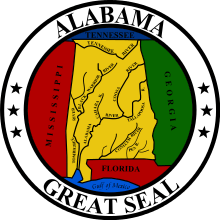Wiregrass Region
.jpg)
The Wiregrass Region — or Wiregrass Country — is an area of the Southern United States encompassing parts of southern Georgia, southeastern Alabama, and the Florida Panhandle. The region is named for the native Aristida stricta, commonly known as wiregrass due to its texture.
Geography
The region stretches approximately from just below Macon, Georgia and follows the Fall Line west to Montgomery, Alabama. From there it turns south and runs to approximately Washington County, Florida in the northern panhandle. From there it runs east, roughly making its southern boundary along Interstate 10 to Lake City, Florida. From there it turns north, roughly following the Suwannee River back into Georgia and along the western fringes of the Okefenokee Swamp. From here it runs due north back to Macon.
Major highways
Interstate 75, Interstate 10, US HIGHWAY 231, US HIGHWAY 331, and portions of Interstate 65 traverse parts of the Wiregrass. The portion of U.S. Route 84 through Georgia is known as the Wiregrass Georgia Parkway.
Major cities
Major cities in the region include:
- Dothan, Alabama
- Enterprise, Alabama
- Eufaula, Alabama
- Ozark, Alabama
- Troy, Alabama
- Albany, Georgia
- Americus, Georgia
- Cordele, Georgia
- Fitzgerald, Georgia
- Thomasville, Georgia
- Moultrie, Georgia
- Tifton, Georgia
- Valdosta, Georgia
- Lake City, Florida
- Live Oak, Florida
- Marianna, Florida
- Tallahassee, Florida
- Panama City, Florida
- Luverne, Alabama
- Opp, Alabama
- Abbeville, Alabama
- Donalsonville, Georgia
- Bainbridge, Georgia
Military bases
The region includes Fort Rucker a U.S. Army post located mostly in Dale County, Alabama. The post is the primary flight training base for Army Aviation and is home to the United States Army Aviation Center of Excellence (USAACE) and the United States Army Aviation Museum. As well as Moody Air Force Base located in Lowndes and Lanier County, Georgia. Moody AFB is the home of the 23d Wing. The wing executes worldwide close air support, force protection, and combat search and rescue operations (CSAR) in support of humanitarian interests, United States national security and the global war on terrorism (GWOT).
Waterways
There are only two major waterways in the region, and they bisect the Wiregrass dividing it into three portions. They are the Chattahoochee River and the Flint River which join to form the Apalachicola River which flows south from Bainbridge, Georgia and Lake Seminole to the Gulf of Mexico at Apalachicola, Florida. Other waterways include Little Choctawhatchee River, Choctawhatchee River, and Choctawhatchee Bay.
Weather
The Wiregrass Region suffers from extremely high humidity in the summer (due to its proximity to the Gulf) and enjoys mild winters. Snowfall occurs occasionally in this region in extremely cold years.
Record snowfall
The Wiregrass Region received over 6" of snow on February 12, 2010. The region hadn't seen this record snowfall since the 1970s or 1990s. The first winter storm warning was issued in the Wiregrass and Florida for the first time in a great while.
Description
Harper's Magazine featured a poem by Charles Ghigna in September 1974 describing the Wiregrass Region titled "The Alabama Wiregrassers."
External links
- Review of A Wiregrass Witness
- WiregrassLive.com - Citizen-driven news and messages
- WiregrassNews.com - Collection of News from the Wiregrass area
- Wiregrass Weather


